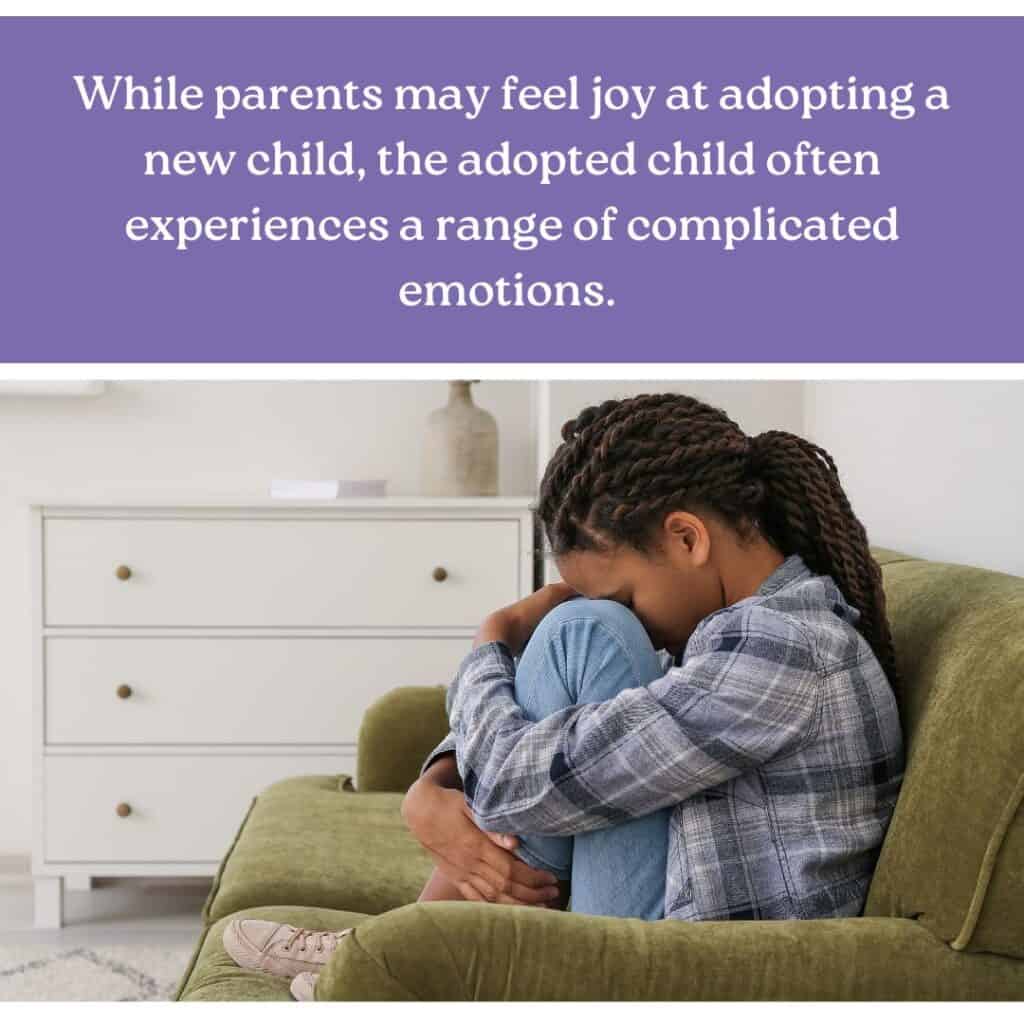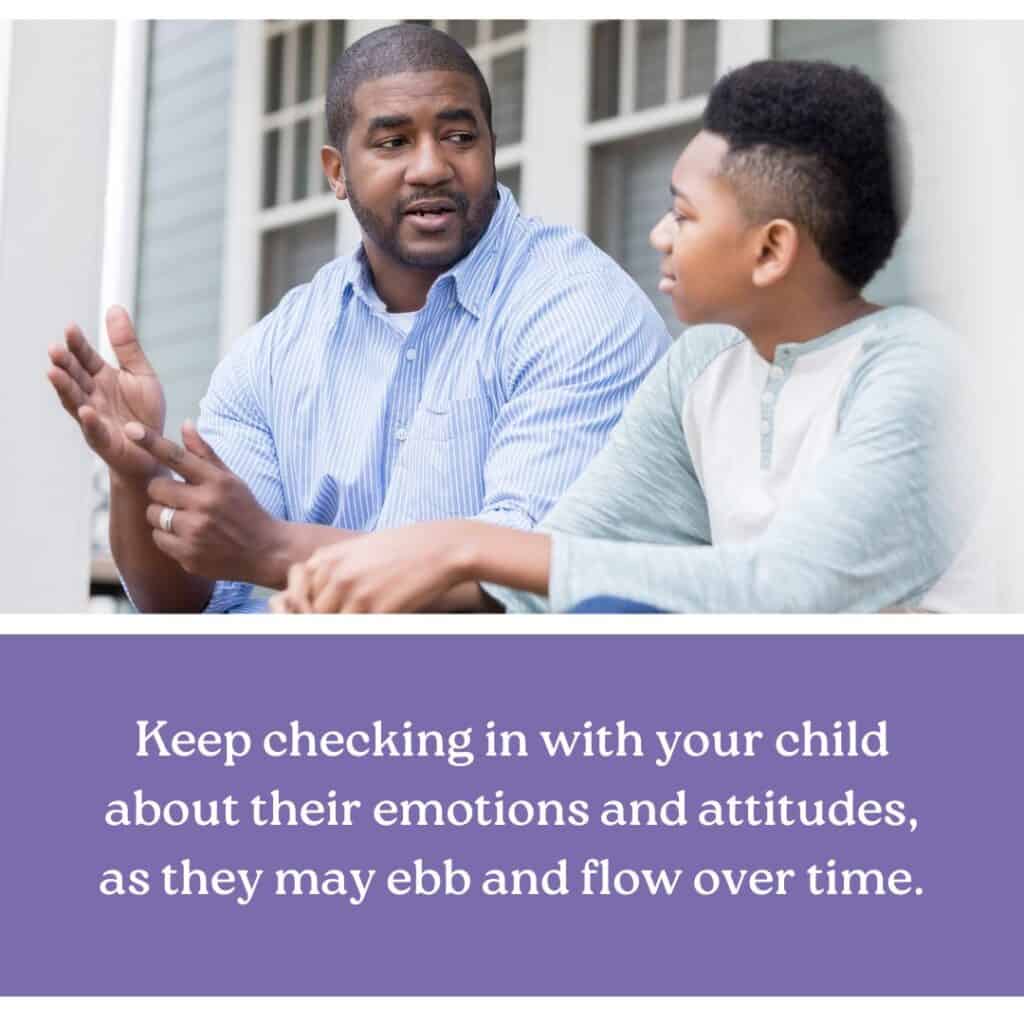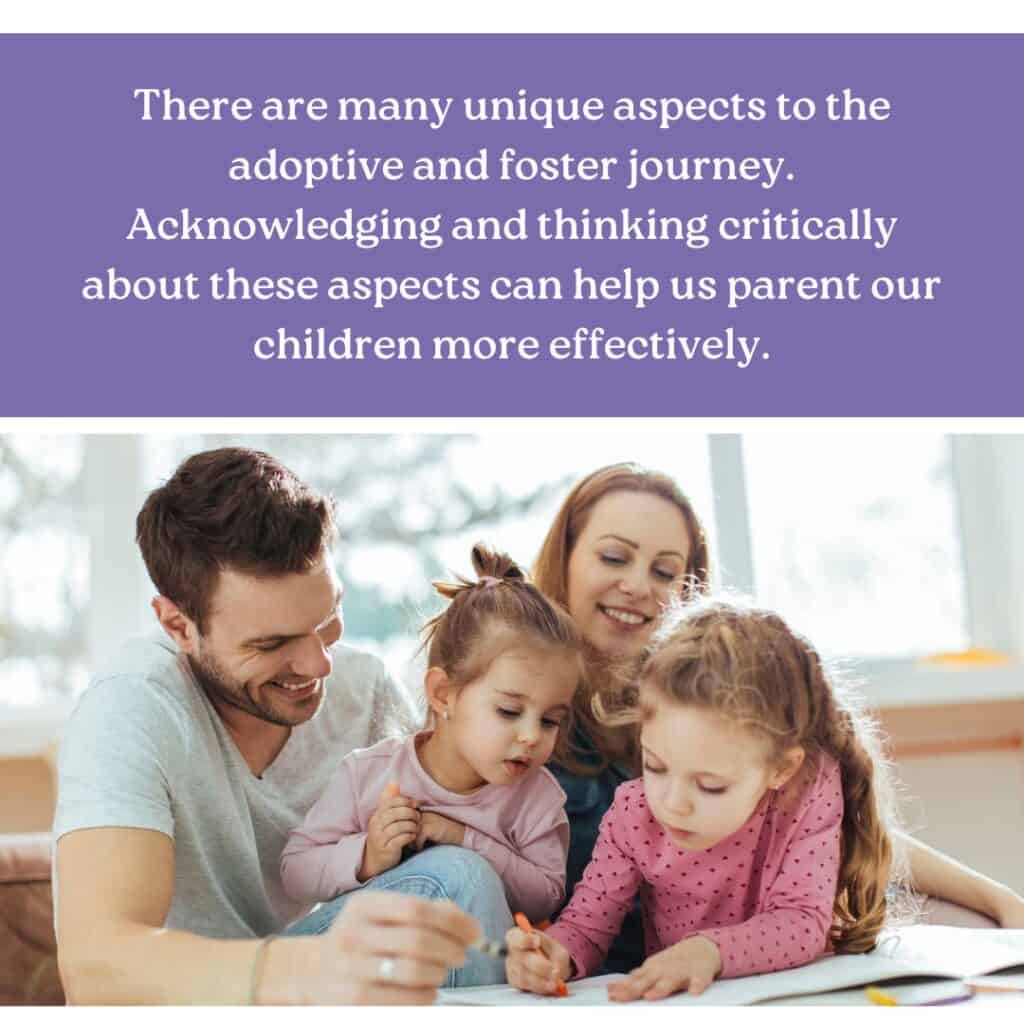I remember working with an 8-year-old boy named Brandon in counseling. Brandon had spent about two years in foster care before he was adopted by his foster family. For his adoptive parents, the adoption was a joyous occasion. They loved Brandon dearly and were so excited to have him join their family permanently. They posted pictures of their family posing with the judge on social media and planned a big adoption party. Many family members and friends congratulated them, saying how excited they were that the adoption had gone through.
But Brandon experienced a range of complicated emotions. He was old enough to understand that adoption was permanent, and being adopted meant that he would not be going back to live with his birth mother. Brandon really wanted to go home to his birth mom and was sad and confused about why she couldn’t do what needed to happen to have him live with her. He also loved his foster family but was feeling very conflicted. During one of our counseling sessions, he shared that his foster family was hosting an adoption day party, but for him, it felt like the saddest day of his life.

When we talk about the uniqueness of the adoption and foster care journey, we often focus on trauma and the impact of trauma on our kids. This is important because the effects of trauma can be pervasive and far-reaching. However, there are other things about the adoption and foster care journey that are important to think about and consider. I cover many of these issues in my recent book, Thriving Families: A Trauma-Informed Guidebook for the Foster and Adoptive Journey. Here, I cover three important factors: (1) grief and loss, (2) cultural and social adjustment, and (3) navigating relationships with birth families.
As I described in my story about Brandon, adoption and foster care often involve a mix of emotions, including grief and loss. How can we help our kids work through their feelings of grief and loss? First, be okay with grief and loss. Sometimes, we may want to “take away” our kids’ grief and loss because we don’t want to see them in pain. But sometimes, this urge to “help” does not honor the grief and loss that our children are experiencing. Instead of trying to help them move past their grief and loss, give them space to be in the process.
Second, when engaging with your kids around their grief and loss, the key is to offer your presence. Again, you usually can’t say anything to “fix” the situation. Instead, just be there with your child and be okay with whatever comes up for them. Support through words or a supportive touch can let your child know that you are there for them, whatever they are going through.
One thing that parents often don’t think about is the cultural and social adjustment that happens when a child is adopted or joins a new foster family. When kids grow up in biological families, they often can rely on their parents to help teach them about their cultural identity because the parent usually shares that identity and set of experiences. But when a parent doesn’t share their child’s cultural identity, they need to be more proactive.
For example, think about your environment and how diverse it is. Try to live in communities that look like your family as best you can. Also, try to link your children with a mentor or role model who shares their cultural identity. The mentor or role model can give your children a safe place to process this important aspect of their identity. In addition, commit to learning about their culture with your child and show genuine interest and excitement about this exploration. Finally, try to initiate conversations about culture, but respect where your child is. Your child’s interest in their cultural identity and background may vary at different points in their development. Be consistent about connecting about your child’s cultural identity and offer opportunities, but don’t force it.

One of the most challenging aspects of adoption and foster parenting is navigating relationships with your child’s birth parents. This can bring up a lot of anxiety in parents, who may not know how to engage birth parents in a safe and respectful way. What are some important considerations for developing healthy relationships with birth families?
First, it is important to notice any negative reactions you might be having toward your child’s birth parents. Ideally, you would have a safe relationship, such as a friend, small group, or therapist where you could process these reactions. Second, when navigating relationships with birth parents, it is important to think about how to include them in the life of your child to the extent it is safe to do so. For example, is it possible to have in-person meetings with the birth parents? If in-person meetings are not possible, would it be possible to have phone or Zoom calls or send pictures or letters?
There may be situations in which you may need to draw boundaries in your relationship with birth parents, especially if the birth parents might be dealing with some serious difficulties or issues. Even in situations such as these, it may be possible to maintain some form of contact in a safe way. For example, if you don’t feel comfortable with the birth family having your home address, could you set up a PO Box to exchange letters? Finally, it is important to acknowledge that your child may want to take a break from connecting with their birth family. This is okay; it is important to follow the needs and wants of your child. But keep checking in—children’s attitudes toward their birth family often ebb and flow over time.

When talking about adoption and foster care, adoptive parents often focus on the impact of trauma on their children’s experience, and this is important. However, there are many unique aspects to the adoptive and foster journey, and acknowledging and thinking critically about these aspects can help us parent our children more effectively.
The post 3 Ways Adoptive Parents Can Help Their Child Adjust appeared first on Focus on the Family.
Continue reading...
But Brandon experienced a range of complicated emotions. He was old enough to understand that adoption was permanent, and being adopted meant that he would not be going back to live with his birth mother. Brandon really wanted to go home to his birth mom and was sad and confused about why she couldn’t do what needed to happen to have him live with her. He also loved his foster family but was feeling very conflicted. During one of our counseling sessions, he shared that his foster family was hosting an adoption day party, but for him, it felt like the saddest day of his life.

Helping An Adopted Child Adjust
When we talk about the uniqueness of the adoption and foster care journey, we often focus on trauma and the impact of trauma on our kids. This is important because the effects of trauma can be pervasive and far-reaching. However, there are other things about the adoption and foster care journey that are important to think about and consider. I cover many of these issues in my recent book, Thriving Families: A Trauma-Informed Guidebook for the Foster and Adoptive Journey. Here, I cover three important factors: (1) grief and loss, (2) cultural and social adjustment, and (3) navigating relationships with birth families.
1. Adoptive Parents Can Support Through Grief and Loss
As I described in my story about Brandon, adoption and foster care often involve a mix of emotions, including grief and loss. How can we help our kids work through their feelings of grief and loss? First, be okay with grief and loss. Sometimes, we may want to “take away” our kids’ grief and loss because we don’t want to see them in pain. But sometimes, this urge to “help” does not honor the grief and loss that our children are experiencing. Instead of trying to help them move past their grief and loss, give them space to be in the process.
Second, when engaging with your kids around their grief and loss, the key is to offer your presence. Again, you usually can’t say anything to “fix” the situation. Instead, just be there with your child and be okay with whatever comes up for them. Support through words or a supportive touch can let your child know that you are there for them, whatever they are going through.
2. Adoptive Parents Can Provide Cultural and Social Adjustment
One thing that parents often don’t think about is the cultural and social adjustment that happens when a child is adopted or joins a new foster family. When kids grow up in biological families, they often can rely on their parents to help teach them about their cultural identity because the parent usually shares that identity and set of experiences. But when a parent doesn’t share their child’s cultural identity, they need to be more proactive.
For example, think about your environment and how diverse it is. Try to live in communities that look like your family as best you can. Also, try to link your children with a mentor or role model who shares their cultural identity. The mentor or role model can give your children a safe place to process this important aspect of their identity. In addition, commit to learning about their culture with your child and show genuine interest and excitement about this exploration. Finally, try to initiate conversations about culture, but respect where your child is. Your child’s interest in their cultural identity and background may vary at different points in their development. Be consistent about connecting about your child’s cultural identity and offer opportunities, but don’t force it.

3. Adoptive Parents Can Navigate Relationships With Birth Families
One of the most challenging aspects of adoption and foster parenting is navigating relationships with your child’s birth parents. This can bring up a lot of anxiety in parents, who may not know how to engage birth parents in a safe and respectful way. What are some important considerations for developing healthy relationships with birth families?
First, it is important to notice any negative reactions you might be having toward your child’s birth parents. Ideally, you would have a safe relationship, such as a friend, small group, or therapist where you could process these reactions. Second, when navigating relationships with birth parents, it is important to think about how to include them in the life of your child to the extent it is safe to do so. For example, is it possible to have in-person meetings with the birth parents? If in-person meetings are not possible, would it be possible to have phone or Zoom calls or send pictures or letters?
Drawing Boundaries as Adoptive Parents
There may be situations in which you may need to draw boundaries in your relationship with birth parents, especially if the birth parents might be dealing with some serious difficulties or issues. Even in situations such as these, it may be possible to maintain some form of contact in a safe way. For example, if you don’t feel comfortable with the birth family having your home address, could you set up a PO Box to exchange letters? Finally, it is important to acknowledge that your child may want to take a break from connecting with their birth family. This is okay; it is important to follow the needs and wants of your child. But keep checking in—children’s attitudes toward their birth family often ebb and flow over time.

When talking about adoption and foster care, adoptive parents often focus on the impact of trauma on their children’s experience, and this is important. However, there are many unique aspects to the adoptive and foster journey, and acknowledging and thinking critically about these aspects can help us parent our children more effectively.
The post 3 Ways Adoptive Parents Can Help Their Child Adjust appeared first on Focus on the Family.
Continue reading...



